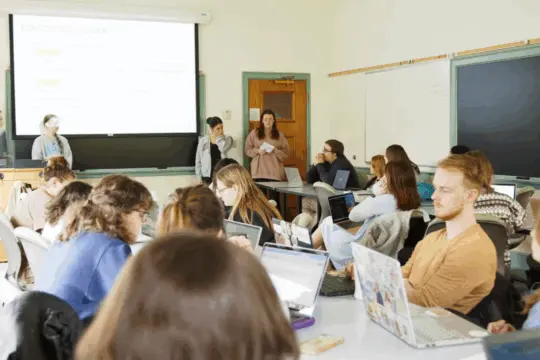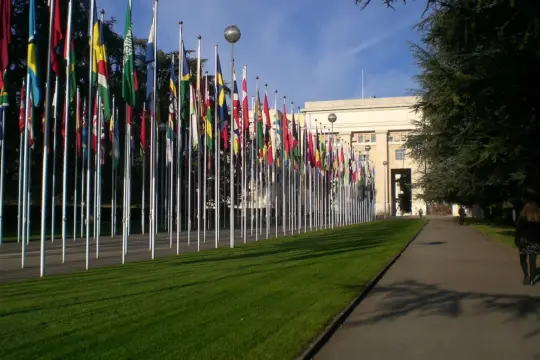
Political Science Degree
Studying political science gives you the tools to understand and contribute to decision-making at the local, state, national and global levels of governance. At Susquehanna, you will study which governments, organizations and individuals influence others and how.
Were you the kid interested in student government or participating in community organizations? Are you curious about how governments work in other parts of the world? Do you want to make an impact in your community? If so, bring that excitement and enthusiasm to Susquehanna as a political science major.
The program is interactive, so you will participate in stimulating topics and debates about current topics with your professors and peers. You’ll gain valuable critical-thinking skills that you will apply to real-world problems. You’ll learn to work with data rather than fear it. As a part of political science being an applied discipline, you also will join all the other majors in experiential learning either through an internship or international study through Susquehanna’s award-winning Global Opportunities program.
Selinsgrove is next door to Harrisburg, Pennsylvania’s state capital, where many political science graduates have found employment, so you’ll be able to network with local alumni. Washington D.C., the nation’s capital and a political hub, and New York City, home to organizations like the United Nations, are just three hours away. You could even shadow a legislative aide and witness democracy in action in your first year!
follow your curiosity about world goverments
Debate current events, conquer data and unravel global dynamics through immersive internships, study abroad opportunities and engaging discussions with professors and peers. Network with alumni in Harrisburg, Pennsylvania’s state capital, and turn your curiosity into action!

SUSQUEHANNA By the Numbers
More Than Metrics
100%
of students complete original research with a faculty advisor
100%
of students participate in a simulation or other academic activities
100%
of students are trained in data analysis
100%
of our full-time faculty have a PhD or terminal degree, and have real-world business experience.
Explore Your Studies
Program Resources
A Glance Into Your Degree Pathway
With support from advisors and course planning tools, your time at Susquehanna is carefully designed to help you succeed. This example provides a glimpse into your degree experience, but you’ll have plenty of opportunities to customize your path with electives or study abroad programs that reflect your passions and career goals.
Surveys the political systems, ideologies and socio-economic policies and issues in various countries and regions of the world. 4 SH. CC: Diversity, Social Interactions.
Examines state behavior in the international system in light of countries’ abilities and limitations. Causes of state action, leaders’ decision making, and the role of power are discussed. Explores why states go to war, the role of the United Nations, the benefits and costs of free trade, and the effects of the environmental and human rights movements. Case studies and current events are used to illustrate theories and provide a framework for discussion. 4 SH. CC: Social Interactions.
Introduces students to the social science research process and common techniques of quantitative and qualitative data analysis. Topics include the development of theory, measurement, data collection and analysis, and research ethics. Requirements include compiling a literature review and using statistical software to conduct data analysis. 4 SH. CC: Ethics Intensive.
Political Science
Choose from a variety of elective courses within this program to customize your goals.
Political Science
Choose from a variety of elective courses within this program to customize your goals.
Political Science
Choose from a variety of elective courses within this program to customize your goals.
This course is an advanced undergraduate course in statistical methods for political research. It covers statistical theory, techniques, and applications of regression analysis in political science, focusing on using statistical methods and statistical software to estimate and test causal relationships. The first part of the course demonstrates how to evaluate arguments and hypotheses statistically through simple and multiple regression analysis. Basic materials include estimation of parameters in bivariate and multivariate regression, hypothesis testing in regression analysis, statistical properties of OLS estimator, assumption violations, and their diagnosis and corrections in practice. The second part of the course introduces more advanced topics such as limited dependent variable and panel data models and focuses on helping students finish the replication term project. Prerequisite: Junior standing and completion of POLI-205. 4 SH. CC: Analytical Thought
Political Science
Choose from a variety of elective courses within this program to customize your goals.
Political Science
Choose from a variety of elective courses within this program to customize your goals.
A capstone course for political science majors. Students research, write and present a senior thesis on an approved topic and participate actively in discussions. Required for all senior majors. Prerequisites: POLI-205 and senior standing. 4 SH. Capstone. CC: Writing Intensive.
Political Science
Choose from a variety of elective courses within this program to customize your goals.
An introductory course covering the major institutions and processes of American government and politics, with a focus on the Constitution, mass political behavior and the decision-making of elected officials. 4 SH. CC: Diversity Intensive, Social Interactions.
Surveys the political systems, ideologies and socio-economic policies and issues in various countries and regions of the world. 4 SH. CC: Diversity, Social Interactions.
Examines state behavior in the international system in light of countries’ abilities and limitations. Causes of state action, leaders’ decision making, and the role of power are discussed. Explores why states go to war, the role of the United Nations, the benefits and costs of free trade, and the effects of the environmental and human rights movements. Case studies and current events are used to illustrate theories and provide a framework for discussion. 4 SH. CC: Social Interactions.
Examines selected topics or problems in American government or comparative government, international politics, or political thought. May be repeated for credit if topic is different. 2 or 4 SH.
Introduces students to the social science research process and common techniques of quantitative and qualitative data analysis. Topics include the development of theory, measurement, data collection and analysis, and research ethics. Requirements include compiling a literature review and using statistical software to conduct data analysis. 4 SH. CC: Ethics Intensive.
This course focuses on understanding how laws are made. We will examine the policy-making process in the United States and, to a lesser extent, in other countries. Who sets the agenda adopted by politicians and policy-makers? What role(s) are played by private actors in the policy-making process? What factors help or hinder the process of implementing policies? Students will consider all of these questions and focus in depth on a number of current policy debates, including immigration policy, environmental policy and education policy. This course is intended to provide students with an understanding of the theories explaining how policies are shaped by the political process and a familiarity with the practical tools used by policy-makers to develop and enforce the rules, policies and laws that we all must follow. 4 SH. CC: Ethics Intensive.
Examines the law and the legal system in the United States, assessing the possibilities and limitations of the law. Studies the political basis of the law and critiques of the American legal system. Discusses the major players in the legal system, including lawyers, judges and juries. Course culminates with a mock trial. 4 SH.
Comparative study of contemporary government, politics, problems and policies in Europe, with a special focus on Western Europe, though some attention is given to countries in Central and Eastern Europe. 4 SH. CC: Social Interactions.
Looks at Russian and Soviet politics and foreign policy. The Soviet Union is examined, with particular emphasis on the policies of Gorbachev and the 1991 disintegration of the U.S.S.R. The post-Soviet period is also studied, especially the challenges of democratization and of moving toward a market economy. While primary attention is paid to the situation in Russia, issues in the other former Soviet republics and Eastern Europe will also be discussed. Same as HIST-226. 4 SH. CC: Historical Perspectives
Detailed research and in-depth discussion on a selected topic. May be repeated for credit. 2 or 4 SH.
This course is an advanced undergraduate course in statistical methods for political research. It covers statistical theory, techniques, and applications of regression analysis in political science, focusing on using statistical methods and statistical software to estimate and test causal relationships. The first part of the course demonstrates how to evaluate arguments and hypotheses statistically through simple and multiple regression analysis. Basic materials include estimation of parameters in bivariate and multivariate regression, hypothesis testing in regression analysis, statistical properties of OLS estimator, assumption violations, and their diagnosis and corrections in practice. The second part of the course introduces more advanced topics such as limited dependent variable and panel data models and focuses on helping students finish the replication term project. Prerequisite: Junior standing and completion of POLI-205. 4 SH. CC: Analytical Thought
This course examines the psychological dimensions of politics, with a particular focus on how citizens make sense of their political surroundings and how their understandings of the political world are linked to their political beliefs and behaviors. Topics include the effects of personality, the role of emotion and reason, the nature of mass decision-making, and the impact of the media on other sources of information. Prerequisite: Sophomore standing. POLI-111 is recommended but not required. 4 SH. CC: Ethics Intensive.
Media and Politics explores how political science, communications, and media studies intersect to help us understand politics today. Encompassing the history, regulation, and expansion of mass media in American life, this course examines the impact of media has on political communication, political process, citizen engagement, governing, and our individual connection to the political world. Prerequisite: Sophomore standing. 4 SH.
This course examines two main questions about political behavior in the American public: why do people participate in politics and why do they vote the way they do? Emphasizes the diverse nature of the American electorate and how decisions are shaped by geographic and demographic factors. Also discusses normative issues associated with voting rights, political knowledge in the electorate, and polarization in American politics. There are no prerequisites for this course, but POLI-111 is recommended. 4 SH. CC: Diversity Intensive.
Studies the many shapes of diversity found in the United States and how this diversity impacts the American political system. Analyzes how different groups have been denied or granted access to the political system and the success or failure of these groups in affecting the political system as voters, candidates and office holders, and in bringing new principles, values, and practices into American politics. The theoretical challenges presented by the general concept of diversity will also be examined. There are no prerequisites for this course; however, POLI-111 is recommended. 4 SH. CC: Diversity Intensive.
An exploration of the power of the American presidency as it has developed over time. Studies presidential authority, the limitations on presidential power, and the presidency’s impact on public policy in the United States. Explores the interplay between individual presidents and the institution of the presidency. Topics covered include the presidential selection process; the relationship between the President and the Congress, “the bureaucracy,” and the courts. There are no prerequisites; however, POLI-111 is recommended. 4 SH. CC: Writing Intensive.
Examines the U. S. Congress as an institution, its responsiveness to public opinion, its relations with other branches of government, and its impact on public policy. Topics include congressional elections, the quality of representation, the internal working of the House and Senate, and the comparison of Congress with state legislatures. There are no prerequisites for this course, but POLI-111 is recommended. 4 SH.
This course looks at the development of African states from the pre-colonial period to the present day and analyzes contemporary issues characteristic of political life in Sub-Saharan Africa. This includes the study of conflict, development, ethnic politics, and democratization. In addition to work describing politics on the continent, students are also introduced to a set of conceptual tools and sources of data that allow them to study African politics. There are no prerequisites for the course although POLI-121 is recommended. 4 SH. CC: Diversity Intensive.
Examines the post-World War II development, institutional structure, and policies of the European Union and its predecessors in the movement toward European integration, with special emphasis on the current situation. 4 SH.
This course focuses on topics relevant to the study of politics and governance outside of the United States. Such topics include the origins, development and current state of party systems in modern democratic governments; the comparison of different modes of political behavior (including public opinion, elections and voting, and protest) in advanced industrial democracies; an examination of how economic policies (including social welfare policies) are developed and implemented under different political systems; and the complex relationship between national identity and the legitimacy of the state. This course is intended to provide students interested in Comparative Politics with a deeper understanding of some of the current lines of inquiry in that field. The course may be repeated for credit if the subtitle (and therefore the course content) is changed. There are no prerequisites, however POLI-121 is recommended. 4 SH. CC: Social Interactions.
Studies the formation and implementation of U.S. foreign policy. Focuses on both the role of the U.S. in the post-World War II era and current foreign and security policy issues. 4 SH.
A study of the relationship between economic development paradigms, institutions and groups in society. The course focuses on the international economic relationships, world order and the resultant social and political conflict. More specifically, this course examines how global economic development policy since the 1960s has influenced relations between states, major institutions, organizations and social groupings in both the developed and the developing world. Same as SOCI-333. Prerequisite: Junior standing and either SOCI-101 or ANTH-162. 4 SH. CC: Interdisciplinary.
A study of the ways of managing the issues that arise from increasing interdependence among nation-states. The course explores the consequences of the growth of international organizations and the proliferation of treaties in areas of security; economics; the environment; and political, social, and human rights. Primary attention is devoted to international governmental organizations, especially the United Nations and the World Court, but international non-governmental organizations (e.g. Amnesty International and Greenpeace) are also considered. There are no prerequisites; however, POLI-131 is recommended. 4 SH. CC: Writing Intensive.
Analyzes issues of war and conflict in the international system, largely from a theoretical perspective. Students examine the questions of why states go to war, how wars can be prevented, how states fight wars, and how such conflicts end. Case studies of wars, including World War II and the current wars in Iraq and Afghanistan, will be studied. Arms control, terrorism, and peacekeeping are also discussed. There are no prerequisites; however, POLI-131 is recommended. 4 SH.
China is rising. With nearly 1.4 billion people, it is the largest country in the world. Its economy has grown precipitously over the last thirty years and, by some measures, is larger than that of the United States. What does this mean for world politics? For the likelihood of war? For the continuance of the US-created liberal world order and issues like human rights and free trade? This course explores these questions, looking through the lens of international relations theories and China’s history and current politics. There are no prerequisites; however, POLI-131 is recommended. 4 SH.
Examines issues of political interaction with economic forces at the national, international and global levels. Topics studied include: economic systems, international trade and finance, the European Union, NAFTA, CAFTA, OPEC, multinational corporations, economic development, poverty, inequality and global environmental issues. Same as ECON-338. Prerequisites: sophomore standing; ECON-201 or ECON-105 or instructor’s permission. 4 SH. CC: Interdisciplinary.
This course examines questions related to the effectiveness and efficacy of democratic forms of governance in serving the people. Who should have a role in decision-making? Are most democratic citizens equipped to participate in decision-making? How can democratic institutions facilitate the participation of large and complex groups of people in geographically large and populous countries? In considering such questions, this course looks to both ancient and modern democratic theorists and analyses politics in both the ancient and post-modern worlds. The course may consider debates surrounding the formation of the Athenian Assembly in Ancient Greece or whether democratic accountability is achievable in international and supranational organizations such as the United Nations and the European Union. The course relies heavily on historical and political simulations, such as those that are part of the Reacting to the Past series. The course is intended to invest students in democratic processes by asking them to consider fundamental questions about democracy while acting as democratic citizens. The course may be repeated for credit if the subtitle (and therefore the course content) is changed. There are no prerequisites. 4 SH.
“Developing nations” and “developing world” are widely used terms but their meaning is ambiguous. Where are these nations? How are “developing” countries different from “developed” ones? And just what does it mean for a country to “develop?” This class addresses these questions. Broadly speaking, it focuses on three big themes: democracy, conflict, and economic change. The course looks at how these themes help interpret what happened in the second half of the 20th century and first decades of the 21st century in Latin America, Africa, the Middle East, and South and Southeast Asia. There are no prerequisites for the course although POLI-121 is recommended. 4 SH.
Examines the U.S. Supreme Court with an emphasis on its major decisions in questions of judicial review, federalism, separation of powers, interstate commerce, state police powers and substantive due process. Emphasizes the Court’s political role and judicial decision making. Prerequisite: Junior standing. POLI-111 is recommended. 4 SH. CC: Interdisciplinary, Writing Intensive.
Examines significant Supreme Court decisions concerning the protection of liberty and equality. Topics covered include freedom of speech and press, church-state relations, right to privacy, criminal procedure, and racial and gender discrimination. Prerequisite: junior or senior standing. POLI-111 is recommended. 4 SH. CC: Writing Intensive.
A capstone course for political science majors. Students research, write and present a senior thesis on an approved topic and participate actively in discussions. Required for all senior majors. Prerequisites: POLI-205 and senior standing. 4 SH. Capstone. CC: Writing Intensive.
Readings, essays and tutorials on a selected political science topic. Prerequisites: Junior or senior standing and permission and arrangement with a department instructor. May be repeated for credit. 2 or 4 SH.
A major research project on a selected political science topic. Prerequisites: junior or senior standing and permission and arrangement with a department instructor. May be repeated for credit. 2 or 4 SH.
Individualized academic work for qualified students under faculty direction. Usually studies special topics not covered in regularly offered courses. 1-4 SH.
Practical experience in a supervised work program. May be for a local, state, or federal government agency, legislative body, political party, legal office or other organization with substantial government-related responsibilities. Only two internship credits may apply to the major requirements. Prerequisites: Junior or senior standing and department’s permission. 2 or 4 SH.
When you enroll at Susquehanna, you’ll be paired with an advisor and application tool to guide you in your course planning and scheduling. The following is an excerpt from the complete course catalog. Enrolled students follow the requirements of the course catalog for the academic year in which they declare each major and/or minor, consult with their advisor(s).
Learning Goals
Students in political science are expected to graduate with an understanding of the major theories and debates in American, international, and comparative politics and with the ability to compare and assess those theories critically. To do so, students will strengthen their understanding of major facts and concepts underlying each of the three fields. Students will recognize the diversity of populations and societies within the United States and globally, as well as the political, social and economic effects of different categories of diversity. Students will develop competency in conducting scholarly research, including the ability to critically read scholarly work and to perform their own research utilizing both quantitative and qualitative methodologies.
Major in Political Science
Majors take 48 semester hours in political science, all with grades of C- or better and at least a 2.00 political science GPA. Twenty-four semester hours of electives are selected with faculty advisor guidance (these may include two hours of internship credit); 16 of these semester hours must be at the 300-level or higher.
- 4 POLI-111 American Government and Politics
- 4 POLI-121 Comparative Government and Politics
- 4 POLI-131 International Relations
- 4 POLI-205 Research Methods I
- 4 POLI-305 Advanced Research Methods II
- 4 POLI-501 Senior Seminar
- 24 hours of electives selected with faculty advisor guidance (may include two hours of internship credit); 16 of these semester hours must be at the 300-level or higher.
The department also recommends additional courses in other areas, depending upon career goals. Frequent choices include business, communications, economics, earth & environmental sciences, modern language, history and sociology.
Secondary Teaching Certification
Secondary Teaching Certification Coursework required by the state of Pennsylvania for admission to the teacher certification program includes successful completion of FYSE-100 or equivalent course (having learning goals related to English composition), at least 3 semester hours in British or American literature, at least 6 semester hours of mathematics coursework (or other courses which satisfy the Central Curriculum Analytical Thought requirement) and at least one 40-hour externship.
Education course requirements for secondary education are:
- EDUC-101 Introduction to Education and Society
- EDUC-250 Educational Psychology
- EDUC-260 Introduction to Special Education
- EDUC-270 Instruction of Exceptional Students
- EDUC-330 Technology in Education
- EDUC-350 English Language Learners: Theory and Instruction
- EDUC-380 Instructional Design
- EDUC-479 Principles of Learning and Teaching in Secondary Education
- EDUC-483 Differentiated Instruction and Classroom Management in Secondary Education
- EDUC-500 Student Teaching package (EDUC-501, EDUC-502, EDUC-503, and EDUC-600)
Political science secondary education students complete the regular political science major with one change in the requirements: rather than taking 24 semester hours of departmental electives, secondary education students take 20 semester hours of departmental electives. In addition to taking the courses listed above, secondary education political science students must complete certification in either social studies or citizenship.
The requirements for certification in social studies are:
- EDUC-425 Methods of Curriculum Instruction and Assessment in Teaching Social Studies
- SOCI-101 Principles of Sociology
- ANTH-162 Introduction to Anthropology
- ECON-105 Elements of Economics
- PSYC-101 Principles of Psychology
- HIST-322 Pennsylvania History or HIST-324 Pennsylvania’s Pasts and Their Publics
- One course in U.S. history (HIST-111, HIST-112 or HIST-115)
- One course in European history (HIST-131 or HIST-132)
- One course in non-Western history (HIST-151, HIST-152, HIST-171, HIST-172, HIST-180 or HIST-181)
The requirements for certification in citizenship are:
- EDUC-427 Methods of Curriculum, Instruction and Assessment in Teaching Citizenship,
- ANTH-162 Introduction to Anthropology
- ECON-105 Elements of Economics
- HIST-322 Pennsylvania History or HIST-324 Pennsylvania’s Pasts and Their Publics
- One course in U.S. history (HIST-111, HIST-112 or HIST-115)
- One course in European history (HIST-131 or HIST-132)
- One course in non- Western history (HIST-151, HIST-152, HIST-171, HIST-172, HIST-180 or HIST-181)
Interdisciplinary Options
Political science majors can easily complete a minor in other departments. Others opt to take a second major. Many choose a related field, such as a modern language, economics, sociology or business. A legal studies minor is a popular choice for those considering a career in the law. International studies, also an interdisciplinary program, is another common option as a minor or second major.
Honors
The departmental honors program encourages and commends outstanding academic work in political science. To graduate with departmental honors, political science majors must do the following:
- Maintain a minimum GPA of 3.50 in the department and 3.25 overall
- Request admission to the program at the beginning of their senior seminar
- Complete and publicly present and defend an honors-quality project in their senior year
Pi Sigma Alpha
Students who satisfy membership requirements may be invited to join the campus chapter of this national honor society in political science.
When you enroll at Susquehanna, you’ll be paired with an advisor and application tool to guide you in your course planning and scheduling. The following is an excerpt from the complete course catalog. Enrolled students follow the requirements of the course catalog for the academic year in which they declare each major and/or minor and consult with their advisor(s).
Minor in Political Science
A political science minor complements many other majors. The minor requires 24 semester hours with grades of C- or better and at least a 2.00 GPA in the minor.
Required courses include:
- POLI-111
- POLI-121
- POLI-131
At least 4 of the 24 semester hours must be at the 300-level or above.
- Foreign service officer
- Campaign manager
- Lawyer
- Government contractor
- Nonprofit manager
Recent Employers
Beyond Susquehanna
Where Passion Meets Purpose
Straight from the Nest




“The community at Susquehanna is small, which allows students to have closer relationships with both their professors and fellow classmates.”
— Reagan Heard ’26
“As an athlete, my favorite tradition here at Susquehanna is Thanksgiving dinner, when I enjoy a night out with my teammates for a homemade meal to celebrate the holiday. But, the best part is our coaches serve us dinner.”
— Mackenzie Moran ’26
“I chose Susquehanna for its wide array of political science classes. As someone considering law school, I was impressed by the variety of professors, areas of specialization and options available to political science students. It made Susquehanna the clear choice.”
— Jonathan Ulicny ’27
“Susquehanna’s focus on hands-on learning has truly shaped my experience here, allowing me to apply myself in real-world situations that are going to prepare me for my career. For example, through my internship with the Arlin M. Adams Center for Law & Society, I worked for a public defender, sat in on a trial and met with clients. I’m able to see and work on legal documents, write memos and witness the real-world application of my studies.”
— Hannah Foust ’26
ALUMNA serving
AS DELAWARE SUPREME COURT JUSTICE
“You have to have goals in your head of where you want to end up, but also be flexible enough to be willing to pursue the unexpected opportunity that might be a better fit for you. If I had followed my own path, I would never have ended up where I am now.” – Abigail Myers ’01 LeGrow
Judge Abigail Myers ’01 LeGrow was confirmed as a Delaware Supreme Court justice after having been nominated by Gov. John Carney. At Susquehanna, LeGrow earned a bachelor’s degree in political science.

Meet the Faculty
TAKE A VIRTUAL TOUR
Launch WelcomeYOU MAY ALSO BE INTERESTED IN
See the full list of related programs on the School of Natural and Social Sciences page.
Have Questions?
Contact Us
Start your journey.












